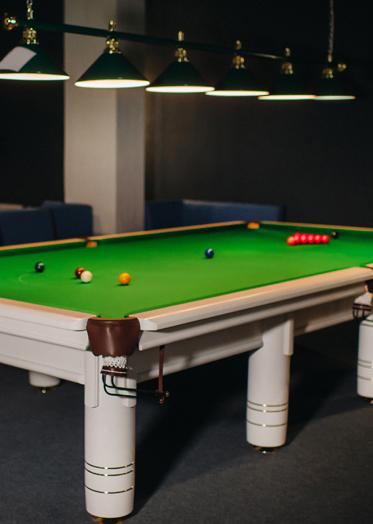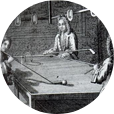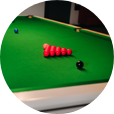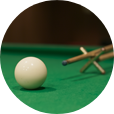Snooker vs. Pool: Understanding the Distinctive Features of Two Iconic Games

When it comes to cue sports, two games reign supreme, and each has its own loyal following. In this discussion of snooker vs. pool, we'll delve into the fascinating world of these two sports, exploring their origins, rules, snooker vs. pool table size, gameplay and cultural significance. We'll also discuss the nuances of these captivating cue sports and discover the unique characteristics that make snooker and pool distinct yet equally enthralling in their own right.
In the Beginning: The Origins of Snooker vs. Pool
Snooker, with its rich history rooted in the refined parlors of the British elite, and pool, the quintessential American barroom pastime, have captivated players and spectators around the world. But what sets these two cue sports apart? Is it the size of the table, the number of balls or perhaps the strategy involved?
While both snooker and pool have carved out unique spaces in cue sports, their origins share common roots. The history of these games stretches back to eras when nobility and the military engaged in indoor versions of lawn games.
Pool's Precursors
The game we now recognize as pool evolved from early table games played in Northern Europe during the 15th century. The term "pool" originally denoted a collective bet or ante. Billiard rooms where pool was played were places patrons would "pool" their bets on horse racing. It's from this context that the game eventually inherited its name. Initially played on a table with pockets and various obstacles, the game gradually refined itself over the centuries.
Snooker's British Army Beginnings
Snooker, on the other hand, has a more recent and distinct origin. Born in the British Empire during the latter half of the 19th century, snooker was a creation of the British Army officers stationed in India. The game's name, "snooker," was a slang term used for first-year cadets or inexperienced personnel. It was coined during a game when a player missed a shot and was jokingly labeled a "snooker." This term eventually became synonymous with the game itself.
Playing by the Rules: The Difference Between Snooker & Pool
At first glance, snooker and pool may appear somewhat similar. But for enthusiasts, the difference between snooker and pool gameplay is vast and fascinating.
Snooker Rules
- Objective: Players must first pot a red ball, followed by any of the colored balls. After all reds are potted, players then pot the colored balls in ascending order of their point values. The player with the most points at the end wins.
- Fouls: A foul in snooker can occur for various reasons, such as failing to hit any ball, hitting a ball out of turn or potting the cue ball. Fouls result in point deductions.
Pool Rules
- Objective: Depending on the specific type of pool, the objectives can vary. In the popular "8-Ball" variant, one player must pot all the solids while the other pots the stripes. The first to pot their designated balls and then legally pot the 8-ball wins. In "9-Ball," players aim to pot the balls in numerical order, with the game-winning shot on the 9-ball.
- Fouls: Similar to snooker, pool has fouls like scratching (potting the cue ball), failing to hit any ball or not hitting the designated ball first. Consequences vary by the game type but often provide advantageous ball placement for the opponent.
Strategies: Snooker vs. Pool
When comparing snooker vs. pool, you'll see that while both revolve around the central theme of potting balls using a cue, their varied rules and strategies create distinct challenges and pleasures for players.
Both games demand a blend of precision, strategic foresight and sometimes a bit of risk-taking. While these strategies offer a foundation, the beauty of snooker vs. pool is that each game presents unique challenges, requiring players to adapt and innovate on the spot.
Strategies for Snooker
- Safety Play: Especially at the professional level, snooker involves strategic safety play. This means playing shots that make it difficult for the opponent to return a shot without leaving an opening. Positioning the cue ball behind a colored ball, making a direct shot on a red ball difficult or impossible, is a common safety tactic.
- Break Building: Once a player gets an opportunity, scoring as many points as possible in a single visit is crucial. This is known as break building. The key is to pot the black (worth the most points) after each red ball, ensuring the black returns to its spot, thus setting up another red and black combination.
- Ball Control: Controlling the white ball's position is vital. This allows players to line up the next shot, especially when trying to pot colored balls in sequence after the reds are all potted.
- Assessing the Table: A good player always thinks several shots ahead. By understanding the table's layout, you can plan your shots and navigate potential problem areas.
Strategies for Pool
- Positional Play: In games like 8-Ball, it's not just about potting balls. It's equally important to ensure the cue ball ends up in a favorable position for the next shot. Proper angles and speeds are crucial to "run the table."
- Defensive Shots: If you can't pot a ball or gain a significant advantage, sometimes the best strategy is to play defensively. This might involve blocking pockets with your balls, making it difficult for the opponent to clear their balls.
- Break Shot: A powerful and well-aimed break can set the tone for the rest of the game. Ideally, you'll want to scatter the balls while maintaining control of the cue ball, avoiding a scratch (potting the cue ball).
- Ball Selection: In 8-Ball, once a player pots either a stripe or solid after the break, they must continue potting that type of ball until they're all cleared. Choose the group (solids or stripes) with the most open shots or fewer obstacles.
- Use of English: "English" refers to the spin on the cue ball. By mastering different spins (topspin, backspin, sidespin), players can control the cue ball's path after it strikes another ball, allowing for better positioning for subsequent shots.

Snooker Table vs. Pool Table
The environment in which you play profoundly impacts the game's strategy and techniques. Beyond the gameplay, size is one of the most noticeable variations between snooker table vs. pool table. Let's break down each difference between snooker and pool tables:
Pool Table Size
- Standard Size: The most common size for professional pool competitions is the "regulation" or "tournament" size, which measures 9 feet by 4.5 feet.
- Bar or Pub Size: Often found in casual settings like pubs or bars, these pool table dimensions are 7 feet by 3.5 feet. They're more compact, making them suitable for tighter spaces.
- Other Variants: There are other sizes, such as the 8-foot x 4-foot table, which provide a middle ground between the professional and bar sizes.
Snooker Tables
- Standard Snooker Table Size: A regulation snooker pool table, often seen in professional competitions, is much larger, measuring 12 feet by 6 feet. This expansive play area demands more precision and control from players.
- Smaller Variants: While the full-sized table is the most popular for professional play, smaller snooker tables exist for recreational or amateur use. Snooker table dimensions like 10 feet by 5 feet are not uncommon in homes or clubs with limited space.
The difference in size between snooker table vs. pool table is not just a matter of space; it deeply influences the gameplay. A snooker table's larger size means longer shots, a greater emphasis on accuracy and more strategic positioning. On the other hand, a pool table's comparatively smaller dimensions often result in a faster-paced game with a higher emphasis on ball placement and strategy.
The Tools of the Trade: Snooker vs. Pool Equipment
While both snooker and pool are cue sports played on rectangular tables, the equipment they utilize reflects the unique characteristics and challenges of each game. Here's a comparative look at the key equipment for snooker vs. pool:
Cues
- Snooker: Snooker cues are typically lighter and have a smaller tip diameter, ranging from 9 to 10.5 mm. This allows for the precision required to strike the smaller snooker balls accurately. Snooker cues are often made of ash wood, which gives them a distinct, smooth-tapered appearance.
- Pool: Pool cues tend to be heavier with a broader tip, usually between 12 and 13 mm. This aids in making powerful shots, a necessity given the larger and heavier nature of pool balls. Maple is a common wood choice for pool cues, giving them a denser feel.
Balls
- Snooker: Snooker balls are smaller, with a standard diameter of 52.5 mm. There are 15 red balls, 6 colored balls of varying point values and a white cue ball. They're designed for finesse shots and breaks that scatter less aggressively than in pool.
- Pool: Pool balls are larger, typically measuring 57.2 mm in diameter. Depending on the game variant (8-ball, 9-ball, etc.), players use balls numbered 1 through 15 and a cue ball. Their larger size demands more forceful shots, especially on the break.
Table Cloth
- Snooker: Snooker tables are covered with a finer, napped cloth, usually made of 100% wool. The nap, or directional texture of the fabric, affects the ball's trajectory, requiring players to account for it during play.
- Pool: Pool table cloths are typically made from a faster, nap-free material, often a blend of wool and nylon. The consistency of the surface allows for more predictable ball movement.
Pockets
- Snooker: The pockets on a snooker table are narrower, especially at the corners. This makes potting balls more challenging, demanding higher accuracy.
- Pool: Pool table pockets are generally wider, accommodating the game's larger balls. This design slightly eases the potting challenge but places a premium on strategy and ball positioning.
Stephen Hendry vs Gareth Potts | 8 Ball Pool
Scottish Snooker Player Stephen Hendry swaps cues with World Champion Pool Player Gareth Potts in a game of 8 Ball.
Frequently Asked Questions About Snooker vs. Pool
Below we've answered some of the most common questions about snooker vs. pool. If you'd like to know more, you can always touch base with the experts at FCI Billiards.
Is Snooker the Same as Pool?
Decidedly not – snooker and pool are distinct cue sports with different rules, table sizes and equipment. Think of them as cousins, not twins.
What Is Snooker?
Snooker is a cue sport that originated in the British Empire during the latter half of the 19th century. It's played on a rectangular table covered with green cloth and features 21 colored balls: 15 red balls, each worth one point and 6 other colored balls with varying point values. The objective of the game is for players to pot the balls into pockets in a specific sequence to accumulate points, with the player scoring the highest number of points declared the winner. The game is known for its strategic depth, precision and break-building skills.
What Is a Snooker Table?
A snooker table is a large, rectangular table specifically designed for playing snooker. It typically measures 12 feet by 6 feet, making it larger than most pool tables. The table surface is covered with a fine, napped cloth, usually made of 100% wool, which can affect the ball's trajectory. The table features six pockets – one at each corner and one in the middle of each of the longer sides. The pockets on a snooker table are narrower compared to pool tables, demanding greater accuracy from players. It also has markings like the "D" at one end, which is used for specific shots and game situations.
What Is a Pool Table?
A pool table is a rectangular table designed specifically for cue sports like 8-ball, 9-ball and other pool game variants. It's typically covered with a nap-free cloth, often a blend of wool and nylon, which allows for consistent ball movement. Standard competition pool tables measure 9 feet by 4.5 feet, though various sizes exist, from the smaller bar or pub tables (7 feet by 3.5 feet) to intermediate sizes. The table has six pockets – one at each corner and one in the middle of each of the longer sides. Unlike snooker tables, pool table pockets are generally wider to accommodate the game's larger balls. The design and dimensions of the pool table cater to the game's strategy, requiring both skillful shots and tactical ball placement.
Snooker vs. Pool: Navigate the Differences with FCI Billiards at Your Side
Whether you're diving into the strategic depths of snooker or mastering the tactical intricacies of pool, having the right equipment is crucial. At FCI Billiards, we understand the nuances that differentiate snooker vs. pool. Our curated selection of premium pool cues, top-notch billiard accessories and high-quality supplies ensures you're always at the top of your game. Shop today!
Related Articles: Snooker vs. Pool
 How to Clean a Pool Table
How to Clean a Pool Table
Discover some of the best tips, tricks, & accessories for cleaning a pool table, pool table maintenance, and more.
Recent Posts
-
January 22, 2025 By FCI Billiards When your game has progressed beyond the basics, it may be ti …Jan 22nd 2025
-
December 6, 2024 By FCI Billiards A pool cue tip may not be the most exciting piece of equipmen …Dec 6th 2024
-
July 29 2025 By FCI Billiards Taking on a new sport can be a little intimidating, particularly if …Nov 5th 2024











